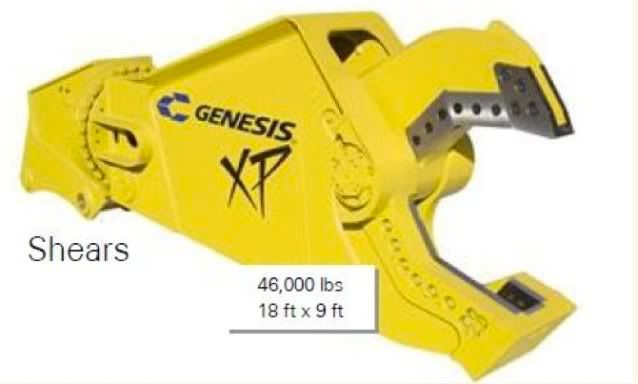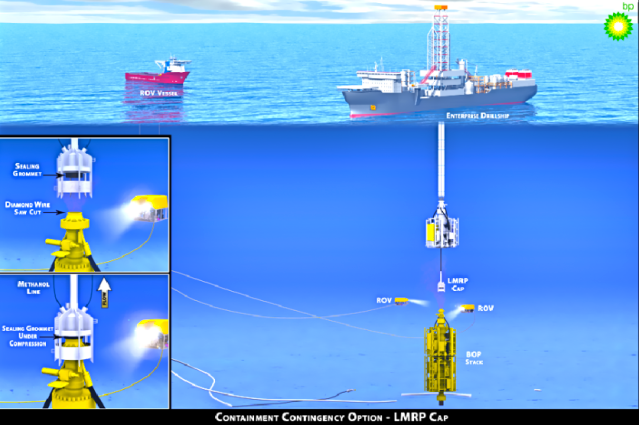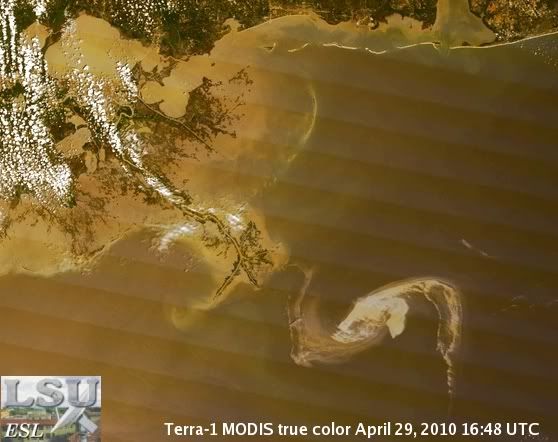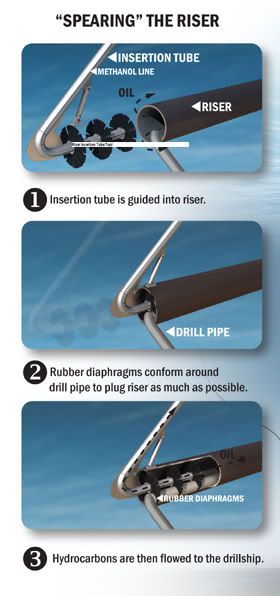Because it is Saturday Night and we all needed a humor piece-
There is a blog that was published 2 hours ago uhm, …. somewhere else. It is called “About that third leak” It was wreckomended.
It uses pics and video from a breathless ABC news report and tells us:
But we have not seen them installing a valve and closing it on, from the video above appears to be the very worst leak?.No video has been released of the third leak valve installation operation therefore no-one can trust, but verify, that they have dealt with this effectively.
Geebus H. Cricket on a Swamp Canoe.
I’ll start close to the source of the oil and methane gas coming out – the wellhead, with the BOP and riser pipe, and work my way out.
This is the first leak. It is coming out of the bent over riser pipe and the drill pipe inside of that, at the wellhead above the Blow Out Protector. Hold up your thumb. That’s one. 1.
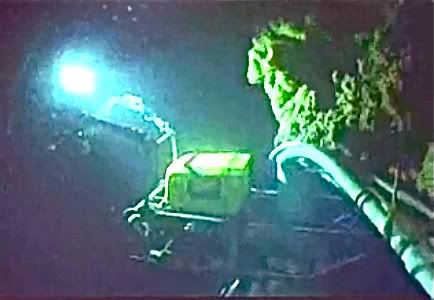
6/1/2010 The Plume Coming off the bent riser pipe near the BOP top. & Sawing machine working on pipe.
This is the second leak. They capped it first. Hold up your index finger. That’s two. 2.
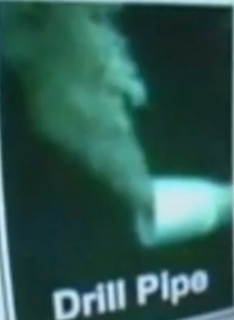
Drill pipe leak
Look familiar ? Back atcha.
re: The broken off piece of drill pipe. This was inside the riser pipe but sticking out further. It was near the top of the water originally. Know why it’s bigger on the end ? That’s a joint where pieces join together. It came apart there. They used different sizes of pipe in the well.
This is the “third leak.” It’s at the middle of the riser pipe. Technically, it’s the 2nd in line going from the well out the pipe. It was the end that was attached, then broke loose, from the Transocean oil drilling rig floating above the surface on the Gulf waters. It’s 5000 feet long, and it folded as it bent over and landed on the ocean floor. Where it folded, it has kinked, broken, and leaked. There is one pipe inside the other, and both were leaking, which meant the cement failed on the well casing bore hole. It has the “sippy tube” collection device in it here. Hold up your pinkie. That’s three. 3.
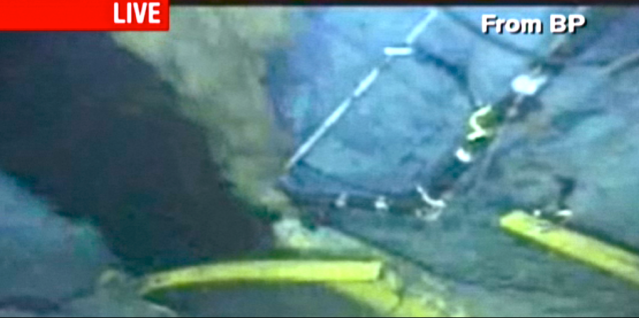
Endpipe, riser + drill, sippy tube
Here is a drawing that shows how the bent over riser pipe with the drill pipe inside of it looks on the ocean floor. Leak 1 on at the top of the BOP. Leak 2 where the pipes bent on the seafloor, and they used a sippy tube to experiment with collecting the oil, but it says “tophat.” Leak 3 is the very end, or beginning, of the pipe, where they capped it. The end farthest from the well has the smallest leak. It is not a government or BP conspiracy. It’s hydraulics. http://en.wikipedia.org/wiki/H… The science of liquids.
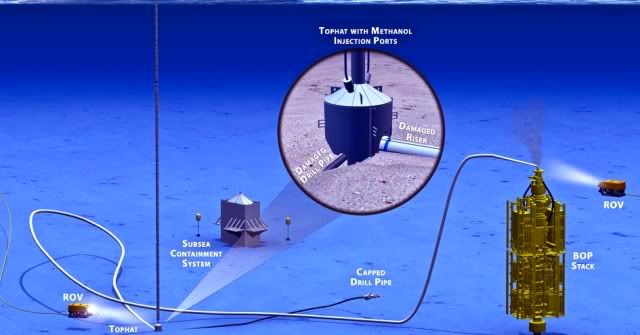
Graphic of the bent pipes from the well laying on the sea bed.
On Tues, June 1st, they started sawing on the bent over pipes coming out of the top of the Blow Out Protector on top of the well head on the seafloor.
They used one of these
And then they used one of these
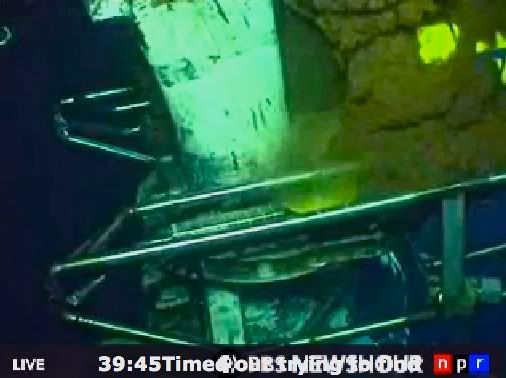
Diamond Rotary Pipe Saw Machine and Clamp On Bracket
And when that didn’t work, they went to THIS.
Eventually, they sawed, crimped, and nipped all the pipes off the Blow Out Protector, leaving a single big riser pipe stub coming out of the top, which looks like a tree stump painted white. (The smaller drill pipe coming from the well is inside this. Both pipes are leaking. ) The rough edges of the riser were ground down with another polishing tool. Then later last week, they lowered a collection cap “Lower Marine Riser Package” over it, after they fitted it with a rubber gasket.
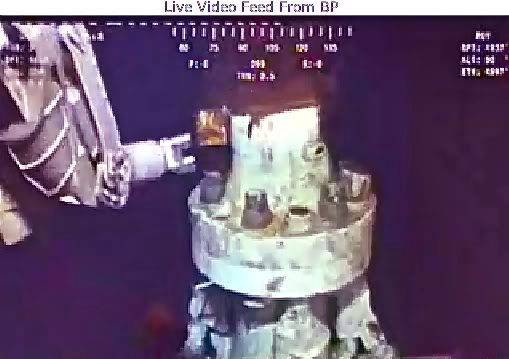
Here’s stumpy getting his edge polished 6/3/2010
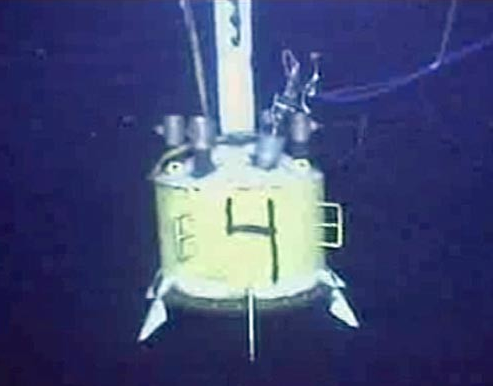
LMRP BOP CAP #4 webcam voyage to the bottom.
Yes, it leaks.
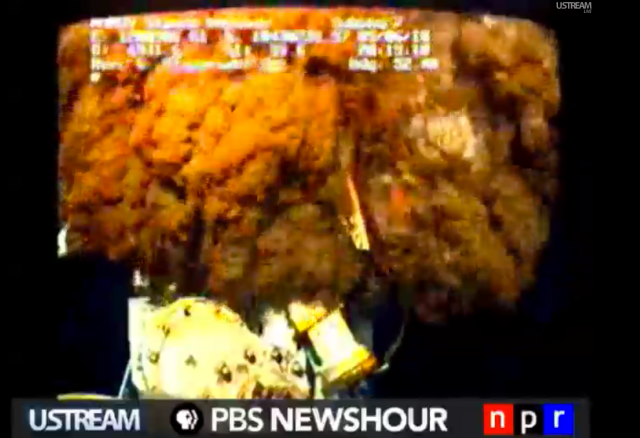
BOP CAP #4, IN SITU Saturday June 5, 2010
Hold up your thumb.
In the shape of an “L” on your forehead. “Lost”
There is only one leak now. 1. The other 2 leaks were in the pipe pieces they cut off.
See how easy that is ?
And this is how we knew the leak was releasing a lot of oil, BEFORE May the 12th.
Government satellite of the Louisiana Mississippi Delta, picture April 29, 2010. This was published by NOAA/NASA on the internet and subsequently picked up by Louisiana State University ES Lab and republished on their website, with permission to republish.
The size of the area may be estimated. There are formulas which can be used to calculate how much oil spreads out how far. On the internet. What you see is like looking down on top of a funnel cloud here, only one dimension. There is more.
They knew. In April. There is no way the Commander in Chief the President did not know this was going to be a large spill a few hours after the flaming, smoking hulk of Deepwater Horizon toppled into the sea. It looked like a monster Tiki torch. Once it stopped burning, the oil and gas was not coming to the top anymore, but in the water. BP knew. The rig survivors knew. The MMS knew, they had the plans for the well on file, which would indicate how much it was going to produce per day, by its design. The Coast Guard knew. The blogs knew.
Did they want to admit the potential, right off ? Of course not.
The MSM was, of course, reluctant to admit that everything was going to go to slow motion hell.
There is a ship called the Enterprise, with a pipe going down to that LMRP BOP CAP, attempting to process the oil they manage to bring to the surface. It can process 15,000 barrels a day of oil maximum. This might be half of what is coming up out of the well. It might not be. The #4 CAP won’t capture all the released oil/gas. Without a way to shut it off precisely, totally, and quickly at the bottom, in case of emergency, the oil gathering ship above doesn’t have a way to safely emergency disconnect in case of a sudden gusher of violent gas, aka a bubble or “kick,” which did in the first well drilling rig. So it’s a sloppy connection, by design.
Nobody is happy about this, but who wants to see the Enterprise go up in a fireball.
The well bore hole is thought to be badly damaged because the cement liner failed. (thanks, Halliburton, you b*stards.) Without an intact borehole, this thing could get very dicey suddenly. This is why they are not attempting to put another Blow Out Protector on top. You can shut it off at the top for a while, but you want to be able to then PLUG it much farther down before the BOP shoots off like a cork.
Some of the plume you are seeing in the picture is methane gas coming out of liquid solution and expanding rapidly. It is getting flared off at the surface ship, what doesn’t turn into methane hydrates at the bottom of the Gulf because of the extreme pressure and cold temperatures. Methane is not going to wash ashore onto the Gulf, and a lot of the crap coming from this well is methane. That is the good news.
I am not trying to minimize the severity and danger and ecologic catastrophe of the situation, I have been one of the ones trying to push the alarm button from the beginning. I have lots more screen captures of that webcam, and thank Heavens that Rep. Markey got after them to show us something.
But can we dispense with the crazy rumors about some “third leak” now ?
Repeat. Some of the plume is methane. Methane isn’t going to wash ashore.
Don’t worry about the plume size coming from some jackwipe ABC video. This is the same channel that gave us the “Path to 9/11” and Mickey Mouse. See how there is a dispersant wand at the supposed giant, mysterious “third leak?” WTF, as they are only applying dispersant at the wellhead near the BOP. That’s where the biggest plumes have been. What utter tripe. Worry about the volume of oil, the pressure, and the rate of flow. Worry about the visible sheen of oil now covering about a third of the Gulf. Or the oil patches that have been documented or will be. Worry about protecting the cleanup workers from toxins. Worry about the wildlife and plants and fish and birds. Worry about the deteriorating well bore. Worry that the government and BP in collusion, jointly lowballed the initial amount of the leak by a huge factor to the public. Worry that anybody believes that ABC couldn’t find somebody to explain this to them, and that they are busy spinning an alternate CT storyline already. I saw the old “industry expert” peddling this “Government is still hiding a Secret Leak” routine on cable television. One blogger said, paraphrased, “he used to be a real industry expert. Something has happened with age. I hope there is someone to look after his affairs now.”
Facepalm.
_______________
photos taken as screenshots off of live webcam feed as provided by BP to the American people because of Rep. Markey, and definition and color bumped by me. some photos by NASA and NOAA, LSU/ESL, or from the Unified Command US government website which had the BP graphics. UC JIC also has a good twitter feed which leads to other links. http://twitter.com/oil_spill_2010
Oil Drum is the recommended blog to continue to find explanations as to what may be going on, along with satellite photos from NRL Monterey, NASA, and NOAA. http://www.nrlmry.navy.mil/nex…


